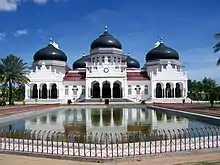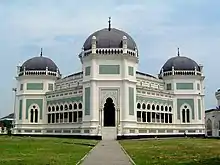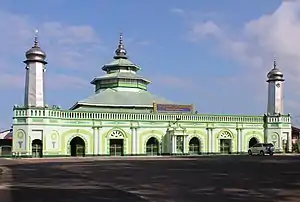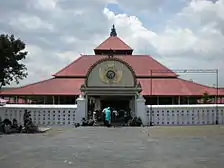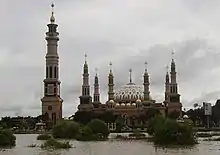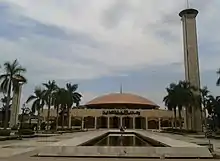Baiturrahman Grand Mosque
Baiturrahman Grand Mosque is a Mosque located in the center of Banda Aceh city, Aceh Province, Indonesia. The Baiturrahman Grand Mosque is a symbol of religion, culture, spirit, strength, struggle and nationalism of the Acehnese people. The mosque is a landmark of Banda Aceh and has survived the 2004 Indian Ocean tsunami.
| Baiturrahman Grand Mosque | |
|---|---|
Masjid Raya Baiturrahman مسجد رايا بيتر الرحمن Meuseujid Raya Baiturrahman Grote moskee van Baiturrahman | |
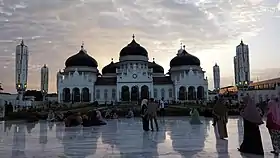 Baiturrahman Grand Mosque | |
| Religion | |
| Affiliation | Islam |
| Branch/tradition | Sunni (Shafi'i) |
| Location | |
| Location | |
| Geographic coordinates | 5°33′13″N 95°19′1.9″E |
| Architecture | |
| Architect(s) | G. Bruins |
| Type | Mosque |
| Style | Mughal revivalism |
| Groundbreaking | 1679 |
| Completed | 1706 |
| Specifications | |
| Capacity | 30,000 |
| Interior area | 1,500 m2 (16,000 sq ft) |
| Dome(s) | 7 Domes |
| Minaret(s) | 8 Minarets |
History
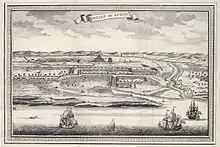
The original Masjid Raya ("Grand Mosque") was built in 1612 during the reign of Sultan Iskandar Muda. Some say the original mosque was built even earlier in 1292 by Sultan Alaidin Mahmudsyah. The original royal mosque featured a multi-tiered thatched roof, a typical feature of Acehnese architecture.[1]
When the Colonial administration of the Dutch East Indies attacked the Kraton During the First Aceh Expedition on 10 April 1873, the Acehnese attacked the KNIL from the Baiturrahman Grand Mosque. From some flares shot onto the thatched roof, the mosque caught fire. General van Swieten promised the local rulers he would rebuild the mosque and create a warm place for mercy. In 1879 the Dutch rebuilt the Mosque Baiturrahman as a gift to — and to reduce the anger of — the Acehnese. Construction only began in 1879, when the first stone was laid by Tengku Qadhi Malikul Adil, who became its first imam, and was completed on 27 December 1881 during the reign of Muhammad Daud Syah, the last sultan of Aceh. Many Acehnese initially refused to pray at Baiturrahman because it was built by the Dutch, whom they were warring against. Nowadays, however, it is a source of pride for Banda Aceh.[2]
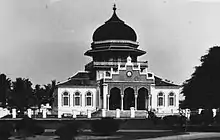
At first, the mosque featured only one dome and one minaret. More domes and minarets were added in 1935, 1958 and 1982. Today the mosque has seven domes and eight minarets, including the highest in Banda Aceh.[3]
The mosque survived the 2004 earthquake and tsunami with minor damages such as wall cracks. The earthquake had slightly tilted and cracked the 35-meter minaret by the main gate. During the disaster, the mosque served as a temporary shelter for displaced persons and only reopened for prayers after two weeks.[3]
Architecture and design

The mosque was originally designed by the Dutch architect Gerrit Bruins.[4][5] The design was subsequently adapted by L.P. Luijks, who also supervised the construction work done by contractor Lie A Sie.[4] The design chosen is Mughal revival style, characterized by grand domes and minarets. The unique black domes are constructed from hard wood shingles combined as tiles.
The interior is decorated with relieved wall and pillars, marble staircase and floor from China, stained-glass windows from Belgium, well-decorated wooden doors, and ornate bronze chandeliers. The building stones are from the Netherlands. At the time of its completion, this new design presented a stark contrast compared with the original mosque that many Acehnese refused to pray in the mosque, because it was built by the Dutch "infidels". Today however, the mosque has become the pride of Banda Aceh.[2]
Today, the mosque has 7 domes, 8 minarets, and 32 pillars.
Replica
A miniature of Baiturrahman Grand Mosque is featured in Minimundus miniature park, Austria.
Traditions

A scene of the blessing of buffaloes at the end of the fasting month of Ramadan was captured by Dutch photographer Christiaan Benjamin Nieuwenhuis.
See also
References
| Wikimedia Commons has media related to Baiturrahman Mosque. |
- Gunawan Tjahjono (1998). Indonesian Heritage-Architecture. Singapore: Archipelago Press. pp. 81–82. ISBN 981-3018-30-5.
- http://www.travelmarker.nl/bestemmingen/azie/indonesie/bezienswaardigheden/banda_aceh.htm
- http://lestariheritage.net/aceh/webpages/sites01.html Archived 2012-03-21 at the Wayback Machine Aceh Heritage
- http://atjehpost.co/articles/read/4881/Amazing-Baiturrahman-Kisah-Awal-Mula-Masjid-Raya-Banda-Aceh Amazing Baiturrahman; Kisah Awal Mula Masjid Raya Banda Aceh
- Van der Klaauw, C.J., ed. (24 December 1940). Geslachtslijst Bruins. p. 6.
- Oey, Eric M. Sumatra. Periplus Editions (HK) Ltd., 1996.
- Mesjid Besar Baiturrahman




